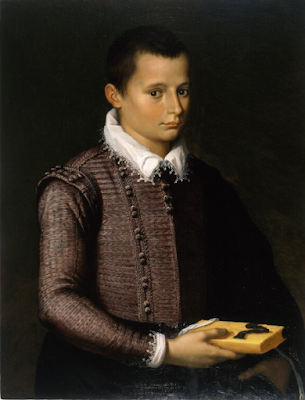-Mus%C3%A9es-d'Art-et-d'Histoire-Gen%C3%A8ve.jpeg) |
| Roman Empire Funerary Portrait of a Matron AD 10 marble Musées d'Art et d'Histoire, Genève |
-Memphis-Brooks-Museum-of-Art-Tennessee.jpeg) |
| Roman Egypt Funerary Mask of a Young Man 1st-3rd century AD painted stucco Memphis Brooks Museum of Art, Tennessee |
 |
| Anonymous Venetian Sculptor Head of a Woman ca. 1450 Istrian stone Isabella Stewart Gardner Museum, Boston |
 |
| Anonymous German Painter Portrait of a Woman ca. 1520-25 oil on panel Mauritshuis, The Hague |
 |
| Anonymous Spanish Painter Portrait of a Man ca. 1550-55 oil on canvas Museumslandschaft Hessen Kassel |
 |
| Anonymous Italian Painter Portrait of a Woman ca. 1550-60 oil on canvas North Carolina Museum of Art, Raleigh |
 |
| Anonymous Spanish Sculptor Portrait of a Woman ca. 1560-70 painted walnut Bayerisches Nationalmuseum, Munich |
 |
| Anonymous Italian Painter Portrait of a Boy with a Book ca. 1560-70 oil on panel Museum of Fine Arts, Houston |
 |
| Anonymous Emilian Sculptor Portrait of a Woman ca. 1550-1600 lead medallion National Gallery of Art, Washington DC |
 |
| Anonymous English Painter Portrait of a Man 1581 oil on panel North Carolina Museum of Art, Raleigh |
 |
| Anonymous European Painter Portrait of a Youth ca. 1628 oil on canvas Agnes Etherington Art Centre, Kingston, Ontario |
 |
| Anonymous European Painter Portrait of a Woman 1693 oil on canvas Agnes Etherington Art Centre, Kingston, Ontario |
-Graphische-Sammlung-Albertina-Vienna.jpg) |
| Anonymous European Artist Portrait of a Youth 17th century drawing (after a painting by Anthony van Dyck) Graphische Sammlung Albertina, Vienna |
 |
| Anonymous English Painter Portrait of a Man ca. 1700 oil on canvas Newport Mansions Preservation Society |
 |
| Anonymous German Painter Portrait of a Man 1818 watercolor on paper Graphische Sammlung Albertina, Vienna |
-Isabella-Stewart-Gardner-Museum-Boston.jpg) |
| Anonymous European Forger Portrait of a Woman 19th century painted plaster (purchased by Mrs. Gardner as a Renaissance work) Isabella Stewart Gardner Museum, Boston |
Matins
Forgive me if I say I love you: the powerful
are always lied to since the weak are always
driven by panic. I cannot love
what I can't conceive, and you disclose
virtually nothing: are you like the hawthorn tree,
always the same thing in the same place,
or are you more the foxglove, inconsistent, first springing up
a pink spike on the slope behind the daisies,
and the next year, purple in the rose garden? You must see
it is useless to us, this silence that promotes belief
you must be all things, the foxglove and the hawthorn tree,
the vulnerable rose and tough daisy – we are left to think
you couldn't possibly exist. Is this
what you mean us to think, does this explain
the silence of the morning,
the crickets not yet rubbing their wings, the cats
not fighting in the yard?
– Louise Glück (1992)